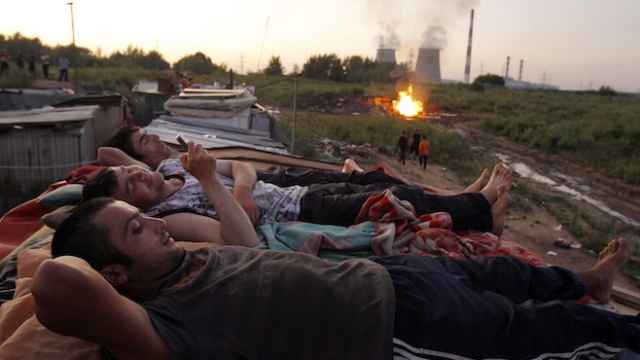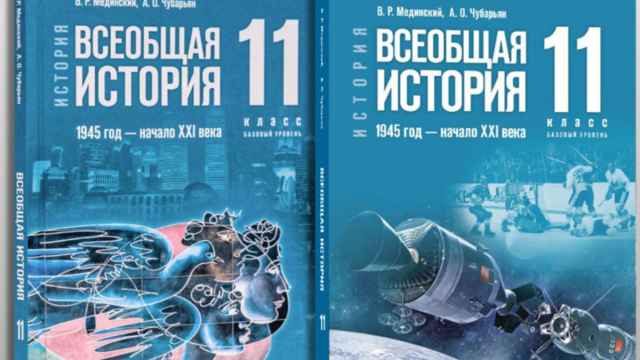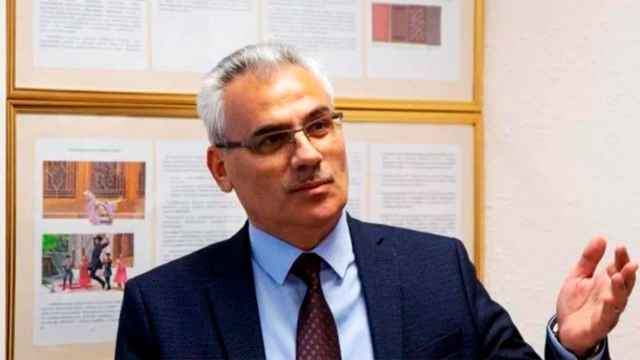Don't speak too loudly in public. Don't wave your arms and hands on public transportation. And don't push.
These are just a few of the helpful hints the Russian Orthodox Church is offering foreign migrant workers, according to media reports.
The recommendations are included in a textbook that the Church published to help migrants — most of whom come from former Soviet republics in Central Asia and the South Caucasus — pass the Russian language, history and civics exam required under legislation that goes into effect on Jan. 1, 2015.
Titled "Russian Language, History and the Foundations of Russian Law," the textbook contains material instructing migrants on "how to behave in public and how to resolve conflicts with the native population," the pro-Kremlin daily Izvestia reports.
On public transportation, "the most important rules are: Don't talk loudly, don't wave your hands, and don't push," Izvestia writes, describing the textbook.
And in the event of a conflict, do not "threaten or use force." Instead, "resolve conflicts peacefully through the use of dialogue, or else people will come to see you as an enemy with whom it is necessary not to speak, but to fight."
And keep the music down! "Loud music and noisy groups are bad because they stop other people working and relaxing," the textbook advises, according to Izvestia.
The book also warns migrants to be chivalrous toward women: "In Russia, there are many unhappy families and single women because many men die early or perish in wars and conflicts. But Russian women regard themselves highly and require respect. If someone offends them, then their male relatives and the state will defend them."
The textbook was edited by Russian Orthodox Church spokesman Vsevolod Chaplin, who made headlines this week when he argued that an art installation of the "Eye of Sauron" advertising the upcoming film in "The Hobbit" series was a "demonic symbol."
Chaplin told Izvestia that the textbook was necessary because it is "important that foreigners understand Russians."
In addition to all the advice on etiquette, the textbook also offers a culinary crash course in which it recommends migrants sample pancakes with "meat, farmer's cheese, jam, caviar and salted fish" during their stay. It itemizes the ingredients that go into Russian dishes like the soups "okroshka" and "shchi." It lists borshch, kvas (a fermented beverage) and kasha (porridge) as national dishes.
The first 1,700 copies of the textbook have already been distributed to civic organizations working with migrants and to centers that are preparing them to pass the language, history and civics exam.
Migrants who pass the exam will be given a certificate necessary to obtain a work permit.
The Orthodox Church's attempts to teach etiquette to migrants is reminiscent of the "Muscovite Guide," a pamphlet Moscow authorities issued in 2010 informing foreigners how to behave in the Russian capital.
Russia's Federal Migration Service estimates that about 12.4 million migrant laborers entered the country last year.
This article was originally published on EurasiaNet.org
A Message from The Moscow Times:
Dear readers,
We are facing unprecedented challenges. Russia's Prosecutor General's Office has designated The Moscow Times as an "undesirable" organization, criminalizing our work and putting our staff at risk of prosecution. This follows our earlier unjust labeling as a "foreign agent."
These actions are direct attempts to silence independent journalism in Russia. The authorities claim our work "discredits the decisions of the Russian leadership." We see things differently: we strive to provide accurate, unbiased reporting on Russia.
We, the journalists of The Moscow Times, refuse to be silenced. But to continue our work, we need your help.
Your support, no matter how small, makes a world of difference. If you can, please support us monthly starting from just $2. It's quick to set up, and every contribution makes a significant impact.
By supporting The Moscow Times, you're defending open, independent journalism in the face of repression. Thank you for standing with us.
Remind me later.






